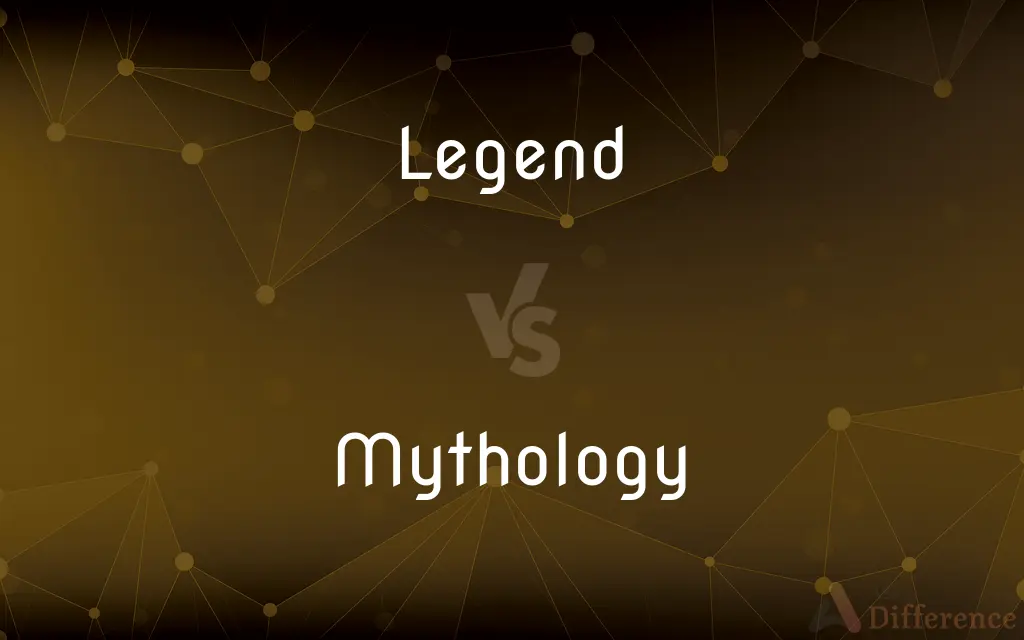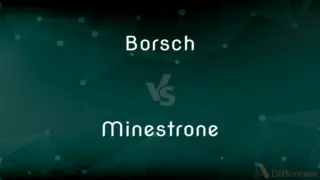Legend vs. Mythology — What's the Difference?
By Tayyaba Rehman & Fiza Rafique — Updated on September 16, 2023
A "Legend" is a traditional story that may contain some historical truth but is generally not verifiable, often featuring heroes or significant events. "Mythology" refers to a collection of myths, generally centered around gods, creation stories, and cosm

Difference Between Legend and Mythology
Table of Contents
ADVERTISEMENT
Key Differences
A "Legend" usually stems from real-life events or characters but is embellished over time, making it difficult to separate fact from fiction. On the other hand, "Mythology" comprises myths that are primarily concerned with gods, heroes, and the nature of the world, often serving to explain phenomena that couldn't be explained otherwise.
In terms of structure, a "Legend" often stands alone as an independent story or narrative. "Mythology," however, is usually part of a larger, more integrated system of beliefs or stories. For example, Greek mythology is a complex, interwoven network of gods, goddesses, and heroes, each story contributing to a larger narrative.
Both "Legend" and "Mythology" are terms most commonly used as nouns. The associated verbs would be "to legendize" for turning an event into a legend and "to mythologize" for converting a story into a myth. The word "Legend" can also be used as an adjective, as in "legendary," while "Mythology" gives us "mythological."
While "Legends" often center on human characters, serving to preserve historical events or moral lessons, "Mythology" focuses on a broader range of subjects including the origin of the world, natural phenomena, and the pantheon of gods and goddesses. It can serve not just to entertain but to encode religious or moral codes of conduct.
Comparison Chart
Definition
Story with some truth
Collection of myths
ADVERTISEMENT
Structure
Usually independent
Integrated system
Grammatical Use
Mainly a noun
Mainly a noun
Themes
Humans, history
Gods, cosmology
Associated Terms
Legendary
Mythological
Compare with Definitions
Legend
A traditional narrative based on historical events.
Robin Hood is a legend rooted in English folklore.
Mythology
A collection of myths, usually of a particular culture.
Greek mythology includes gods like Zeus and Athena.
Legend
A story that has been exaggerated over time.
The legend of Atlantis has captivated people for centuries.
Mythology
A set of beliefs or assumptions.
The mythology of American exceptionalism is deeply rooted.
Legend
An inscription or title on an object.
The legend on the coin read 'In God We Trust.'
Mythology
A body of stories associated with a particular subject.
The mythology surrounding the founding fathers is complex.
Legend
A person renowned for special qualities or abilities.
Michael Jordan is a basketball legend.
Mythology
The study of myths.
Mythology can offer insights into a culture's values.
Legend
A legend is a genre of folklore that consists of a narrative featuring human actions perceived or believed both by teller and listeners to have taken place within human history. Narratives in this genre may demonstrate human values, and possess certain qualities that give the tale verisimilitude.
Mythology
An unfounded or false collective belief.
The mythology that bats are blind has been debunked.
Legend
An unverified story handed down from earlier times, especially one popularly believed to be historical.
Mythology
A body or collection of myths belonging to a people and addressing their origin, history, deities, ancestors, and heroes.
Legend
A body or collection of such stories.
Mythology
A body of myths associated with an event, individual, or institution
"A new mythology, essential to the ... American funeral rite, has grown up" (Jessica Mitford).
Legend
See urban legend.
Mythology
The field of scholarship dealing with the systematic collection and study of myths.
Legend
One that inspires legends or achieves legendary fame
She is a legend in her own time.
Mythology
The collection of myths of a people, concerning the origin of the people, history, deities, ancestors and heroes.
Legend
An inscription or title on an object, such as a coin.
Mythology
A similar body of myths concerning an event, person or institution.
Legend
An explanatory caption accompanying an illustration.
Mythology
Pervasive elements of a fictional universe that resemble a mythological universe.
Legend
An explanatory table or list of the symbols appearing on a map or chart.
Mythology
(uncountable) The systematic collection and study of myths.
Legend
An unrealistic story depicting past events.
Mythology
The science which treats of myths; a treatise on myths.
Legend
A story of unknown origin describing plausible but extraordinary past events.
The legend of Troy was discovered to have a historical basis.
Mythology
A body of myths; esp., the collective myths which describe the gods of a heathen people; as, the mythology of the Greeks.
Legend
A plausible story set in the historical past, but whose historicity is uncertain.
The legend of Robin Hood
Mythology
Myths collectively; the body of stories associated with a culture or institution or person
Legend
A story in which a kernel of truth is embellished to an unlikely degree.
The 1984 Rose Bowl prank has spawned many legends. Here's the real story.
Mythology
The study of myths
Legend
A fabricated backstory for a spy, with associated documents and records.
According to his legend, he once worked for the Red Cross, spreading humanitarian aid in Africa.
Legend
A person related to a legend or legends.
Legend
A leading protagonist in a historical legend.
Achilles is a legend in Greek culture.
Legend
A person with legend-like qualities, such as extraordinary accomplishment.
Michael Jordan stands as a legend in basketball.
Legend
A key to the symbols and color codes on a map, chart, etc.
According to the legend on the map, that building is a school.
Legend
An inscription, motto, or title, especially one surrounding the field in a medal or coin, or placed upon a heraldic shield or beneath an engraving or illustration.
Legend
A musical composition set to a poetical story.
Legend
(naval) The design and specification of a vessel.
Legend
To tell or narrate; to recount.
Legend
That which is appointed to be read; especially, a chronicle or register of the lives of saints, formerly read at matins, and in the refectories of religious houses.
Legend
A story respecting saints; especially, one of a marvelous nature.
Legend
Any wonderful story coming down from the past, but not verifiable by historical record; a myth; a fable.
And in this legend all that glorious deed
Read, whilst you arm you.
Legend
An inscription, motto, or title, esp. one surrounding the field in a medal or coin, or placed upon an heraldic shield or beneath an engraving or illustration.
Legend
To tell or narrate, as a legend.
Legend
A story about mythical or supernatural beings or events
Legend
Brief description accompanying an illustration
Legend
A key that explains symbols on a map or chart.
The legend helped me understand the map's markings.
Common Curiosities
Can a person become a Legend?
Yes, individuals who have left a significant impact can be described as legends.
What is a Legend?
A Legend is a story that contains elements of truth but is often exaggerated or altered over time.
What is Mythology?
Mythology refers to a collection of myths that usually center around gods, heroes, and the creation of the world.
Is a Legend factual?
A Legend may contain elements of historical truth but is not entirely factual.
Can Legends be positive or negative?
Legends can portray characters or events in a positive, negative, or neutral light.
Is Mythology true?
Mythology is generally not considered to be factual but rather symbolic or metaphorical.
How do Legends start?
Legends often start from actual events or people but are embellished over time.
Are myths part of Mythology?
Yes, myths are the individual stories that make up a broader mythology.
Is Mythology religious?
Mythology can have religious elements but is not exclusively religious.
Is Legend a noun or a verb?
Legend is primarily a noun, but it can also be turned into a verb as "to legendize."
Is Mythology a noun or a verb?
Mythology is primarily a noun, with the associated verb being "to mythologize."
What is the plural of Mythology?
The plural of Mythology is "mythologies."
Which is more historical, Legend or Mythology?
Legends are more likely to be rooted in historical events, while Mythology is often more symbolic.
What is the plural of Legend?
The plural of Legend is "legends."
How is Mythology created?
Mythology is often created to explain unexplainable phenomena or to illustrate cultural values.
Share Your Discovery

Previous Comparison
Relife vs. Relief
Next Comparison
Borsch vs. MinestroneAuthor Spotlight
Written by
Tayyaba RehmanTayyaba Rehman is a distinguished writer, currently serving as a primary contributor to askdifference.com. As a researcher in semantics and etymology, Tayyaba's passion for the complexity of languages and their distinctions has found a perfect home on the platform. Tayyaba delves into the intricacies of language, distinguishing between commonly confused words and phrases, thereby providing clarity for readers worldwide.
Co-written by
Fiza RafiqueFiza Rafique is a skilled content writer at AskDifference.com, where she meticulously refines and enhances written pieces. Drawing from her vast editorial expertise, Fiza ensures clarity, accuracy, and precision in every article. Passionate about language, she continually seeks to elevate the quality of content for readers worldwide.











































